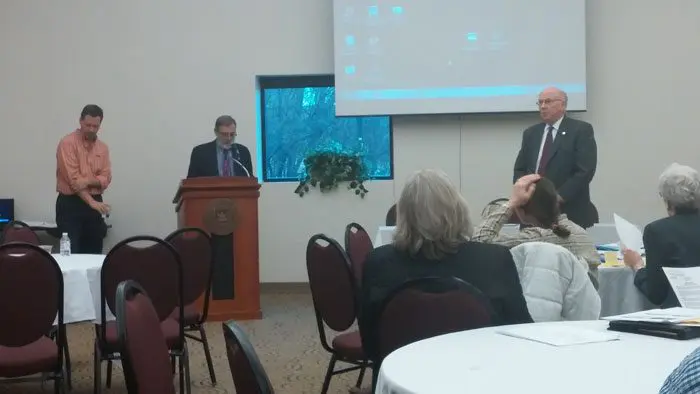
|
| (L-R) Philosophy Professor David Skrbina, Chair of Faculty Senate John Poster, UMD Chancellor Daniel Little. PHOTO: Ali Harb/TAAN |
DEARBORN — The University of Michigan-Dearborn Faculty Congress voted on Monday, March 7 against a resolution that calls for forming a divestment committee to look into the human rights records of companies that do business with the Israeli military.
After a 30-minute debate, the faculty struck down the resolution in a 23-17 vote with two abstentions. Present faculty members voted via ballot box. The faculty also voted 32-7 against a resolution calling for the boycott of Israeli academic institutions. The yearly meeting, which was open to the public, was almost exclusively attended by UMD faculty.
The Student Government (SG) had passed the divestment proposal last week. According to campus newspaper, the divestment initiative was proposed by Students for Justice in Palestine (SJP) and endorsed by eight student organizations. SG has called for divestment on four previous occasions in 2005, 2006, 2010, and 2012, according to campus newspaper The Michigan Journal.
Dr. John Poster, the chair of the Faculty Senate told The Arab American News that the resolution approved by SG is not reflective of the opinion of the student body because most students are not involved in the student government.
“It is difficult for us to focus on this, while [Syrian President Bashar] Assad has killed more than 100,000 of his own people, while the military in Egypt overthrew a democratically elected government,” Poster said. “There is a number of problems in the world, and it is hard for us to focus on Israel only.”
He added that the “great majority” of students are more concerned about issues like parking and tuition than international politics.
Engineering professor Dr. Elsayed Orady, who supports the resolutions, said the results of the vote were “great.”
“There is good progress in the faculty response. In the previous years, barely anybody supported this resolution. 17 people voted for it Monday, so there is improvement,” he said. “It takes time to convince people when it comes to sensitive political issues.”
Orady added that faculty members who were present to vote on Monday do not represent the opinion the whole faculty. He said although the number of attendees to this year’s Faculty Congress meeting was “surprisingly” high compared to previous years, most of them had to leave before voting on the divestment and boycott resolutions.
The faculty were not presented with the resolution until after 5 p.m., the scheduled closing time of the meeting. Prolonged debates on other issues delayed the vote on the proposals, which were the last items on the agenda. By 5 p.m., many seats were empty in the previously overcrowded room.
“Less than half the people who attended the meeting were able to vote. Others have to leave. They have classes,” Orady explained.
The engineering professor had successfully proposed a motion to cast the votes via secret ballot. “The chancellor announced that he’s against the resolution. I proposed the secret ballot to protect both sides and make sure that the administration has no hard feeling against anybody,” he said. “It is a very sensitive issue. Some people might not have voted ‘yes’ if it weren’t a secret ballot. It was better for both sides.”
Orady said the Boycott, Divestment and Sanctions movement (BDS) on American college campuses will impact the Israeli-Palestinian conflict. “It sends a message to the government of Israel that its credibility is deteriorating with time, so it would take steps to resolve the Palestinian issue,” he said. “The movement is getting stronger, and one day Israel has to listen. The debate should continue.”
Philosophy professor David Skrbina presented the divestment and boycott resolutions to the Faculty Congress separately. He said divestment from companies engaged in human rights abuses has been a UMD policy since 1987, when the university divested from corporations that do business with the then-apartheid regime in South Africa.
Skribina cited three reasons to back the resolution. He said Israel is carrying on an ethnic cleansing campaign against Palestinians. He also noted it has committed war crimes, including firing cluster bombs at civilians in recent conflicts in Gaza and Lebanon. Finally, he stated it is an apartheid state that isolates Palestinians in the West Bank with the separation wall and treats its Arab population as second degree citizens.
“People talk about this issue being divisive. I think the status quo is very divisive. We are being asked to support that our university is investing in war crimes, ethnic cleansing and apartheid,” said the philosophy professor. “That’s an extremely divisive issue for our Arab American students and faculty and for those of us who are concerned about the ethics of investing in these kinds of companies.”
UMD Chancellor Daniel Little said the resolutions are “harmful to our students, harmful to our faculty and harmful to the interests of the university.”
Little added that the divestment resolution reinforces the reputation of the campus as unwelcoming to Jewish students, and the boycott resolution is “appalling” and condemns Israeli scholars for legitimate academic partnerships with other institutions.
“Our campus has a reputation for being an unreceptive and even a hostile environment to Jewish students. I don’t believe that’s true, but passing the [divestment] resolution would enhance that reputation without any doubt in my mind at all.”
UMD political science professor Ron Stockton praised the efforts for divestment after SG approved the resolution last week. “The boycott campaign is not likely to impact Israel economically in the short term, so even if these resolutions do not pass, they still succeed in raising the issue,” he told The Arab American News.






Leave a Reply